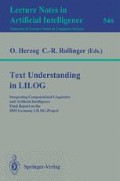Preview
Unable to display preview. Download preview PDF.
References
Allen, J. F. (1983): Recognizing intentions from natural language utterances. In: Brady, M., Berwick, R. C. (eds.): Computational Models of Discourse. MIT Press, Cambridge, Mass., chapter 2, pp. 107–164
Bateman, J. A. (1990): Upper modeling: organizing knowledge for natural language processing. In: Proceedings of the 5th International Workshop on Language Generation, Dawson, PA., pp. 54–61
Bruce, B. C. (1975): Generation as social action. In: Theoretical Issues in Natural Language Processing-1 (TINLAP), Cambridge, Mass., pp. 64–67
Busemann, S. (1988): Surface transformations during the generation of written german sentences. In: McDonald, D. D., Bolc, L. (eds.): Natural Language Generation Systems. Springer, Berlin, New York, pp. 98–165. Symbolic Computation
Carberry, S. (1983): Tracking user goals in an information-seeking environment. In: Proceedings of the 3rd AAAI, Washington
Carberry, S. (1988): Modeling the user's plans and goals. Computational Linguistics 14(3), 23–37
Cohen, P. R., Levesque, H. J. (1990a): Intention is choice with commitment. Artificial Intelligence 42(3)
Cohen, P. R., Levesque, H. J. (1990b): Performatives in a rationally based speech act theory. In: Proceedings of the 28th Annual Meeting of the ACL, Pittsburgh, Pennsylvania, University of Pittsburgh, pp. 79–88
Cohen, P. R., Morgan, J. L., Pollack, M. E. (eds.) (1990): Intentions in Communication. System Development Foundation Benchmark Series. A Bradford Book, MIT Press, Cambridge, MA.
Emele, M. (1987): Frege-Ein objektorientierter FRont-End-GEnerator. In: Morik, K. (ed.): GWAI-87. 11th German Workshop on Artificial Intelligence, Berlin, New York, Springer, pp. 64–73. IFB Bd. 152
Hovy, E. H. (1988): Planning coherent multisentential text. In: Proc. 26th Annual Meeting of the ACL, pp. 163–169
Kaplan, R. M. (1983): Co-operative response from a portable natural language system. In: Brady, M., Berwick, R. C. (eds.): Computational Models of Discourse. MIT Press, Cambridge, Mass., pp. 167–208
Kreyß, J., Novak, H.-J. (1990): The textplanning component pit of the lilog system. In: Proc. 13th International Conference on Computational Linguistics, pp. 431–433
Levelt, W. J. M. (1989): Speaking: From Intention to Articulation. A Bradford Book, MIT Press, Cambridge, MA.
Litman, D. J., Allen, J. F. (1987): A plan recognition model for subdialogues in conversations. Cognitive Scinece 11, 163–200
Mann, W. C. (1987): What is special about natural language generation research. In: Wilks, Y. (ed.): Theoretical Issues in Natural Language Processing. New Mexico State University, Las Cruces, NM., pp. 206–210
McCoy, K. F. (1986): The romper system: Responding to object-related misconceptions using perspective. In: Proceedings of the 24th Annual Meeting of the Association for Computational Linguistics, New York, pp. 97–105
McCoy, K. F. (1987): Contextual effects on responses to misconceptions. In: Kempen, G. (ed.): Natural Language Generation. Martinus Nijhoff, Dordrecht, chapter 3, pp. 43–54
McDonald, D. D., Meteer, M. W. (1988): From water to wine: Generating natural language text from today's applications programs. In: Proceedings of the Second Conference on Applied Natural Language Processing, Austin, Texas, pp. 41–48
McDonald, D. D. (1983): Natural language generation as a computational problem: An introduction. In: Brady, M., Berwick, R. C. (eds.): Computational Models of Discourse. MIT Press, Cambridge, Mass.
Meteer, M. W. (1990): The “generation gap” the problem of expressibility in text planning. Phd thesis, published as bbn report no. 7347, Bolt, Beranek and Newman Inc.
Reiter, E. B. (1990a): Generating appropriate natural language object descriptions. Tr-10-90, Center for Research in Computing Technology, Harvard University, Cambridge, MA. PhD Thesis
Reiter, E. B. (1990b): A new model for lexical choice for open-class words. In: Proceedings of the Fifth International Natural Language Generation Workshop, Dawson, Pa., pp. 23–30
Russell, G., Warwick, S., Carroll, J. (1990): Asymmetry in parsing and generating with unification grammars: Case studies from elu. In: Proc. of the 28th Annual Meeting of the ACL
Sacerdoti, E. D. (1975): A structure for plans and behaviour. North-Holland, Amsterdam
Scott, D. R., de Souza, C. S. (1990): Getting the message across in rst-based text generation. In: Dale, R., Mellish, C., Zock, M. (eds.): Current Research in Natural Language Generation, London, San Diego, New York, Boston, Academic Press, pp. 47–73
Editor information
Rights and permissions
Copyright information
© 1991 Springer-Verlag Berlin Heidelberg
About this chapter
Cite this chapter
Novak, HJ. (1991). Integrating a generation component into a natural language understanding system. In: Herzog, O., Rollinger, CR. (eds) Text Understanding in LILOG. Lecture Notes in Computer Science, vol 546. Springer, Berlin, Heidelberg. https://doi.org/10.1007/3-540-54594-8_85
Download citation
DOI: https://doi.org/10.1007/3-540-54594-8_85
Published:
Publisher Name: Springer, Berlin, Heidelberg
Print ISBN: 978-3-540-54594-1
Online ISBN: 978-3-540-38493-9
eBook Packages: Springer Book Archive

